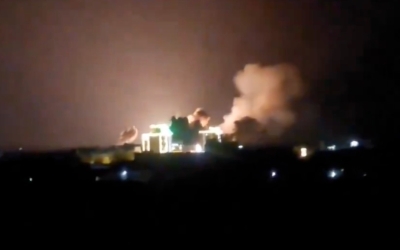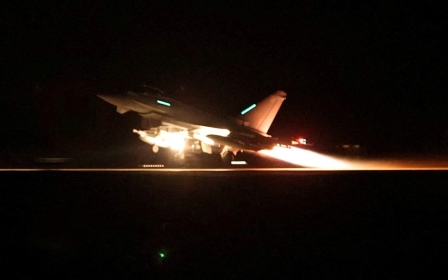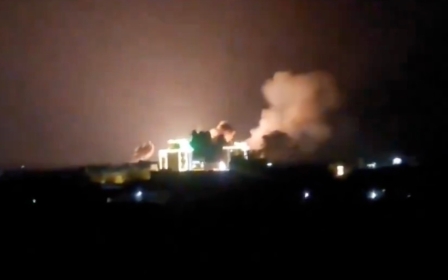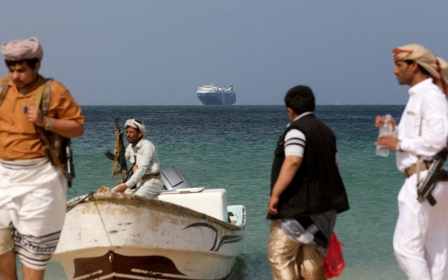What’s behind the US and UK attacks on Yemen and will it widen the conflict?
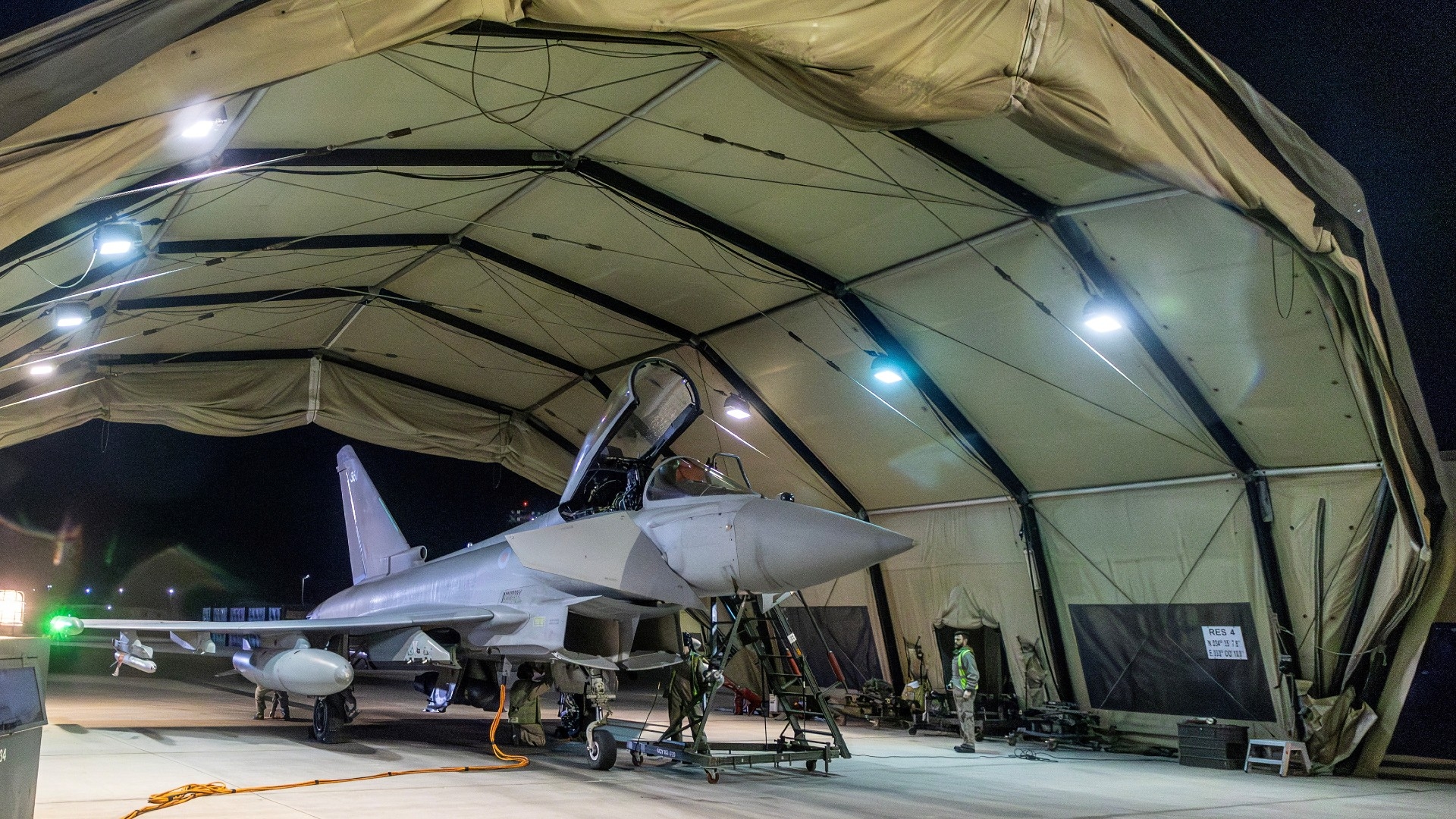
The UK and US attacks on Yemen on Thursday night could turn Israel’s war on Gaza into a wider regional conflict, analysts say and will do little to deter the Houthis from future attacks on Red Sea vessels.
American and British forces launched air strikes against Houthi targets following a spate of attacks on shipping vessels in the Red Sea.
The attacks on the commercial routes in one of the world's most important shipping lanes have in some cases forced shipping firms to suspend operations or take a much longer and more expensive journey around Africa.
The US and UK strikes targeted several cities in the country, including the capital Sanaa, the western port city of Hodeidah, as well as Saada, and Dhamar.
Both Washington and London have repeatedly warned the Houthis against attacking vessels passing through the Red Sea, with US President Joe Biden saying the strikes were because the Houthis are endangering "freedom of navigation in one of the world's most vital waterways".
New MEE newsletter: Jerusalem Dispatch
Sign up to get the latest insights and analysis on Israel-Palestine, alongside Turkey Unpacked and other MEE newsletters
Experts believe the air strikes will have little impact on weakening the Houthis or stopping their attacks, which the Iran-aligned movement says are in response to Israel's war on Gaza.
Andreas Krieg, an author and associate professor at the Defence Studies Department of King's College London, told Middle East Eye that the international coalition recently set up to stop the Houthi campaign in the Red Sea has a very difficult balance to strike with the attacks on Yemen.
'The attack was an attempt to avoid the embarrassment of inaction protect prestige'
- Ibrahim Jalal, Middle East Institute
“Britain and the US want to send a strong message, but not too strong to kind of draw this out into a longer escalation beyond the war in Gaza,” he said.
Krieg said this will be difficult to achieve as “there is no way to strike hard enough to destroy the military capabilities of the Houthis".
He also believes that the Houthis operating as a "network" makes them difficult to deter, as they are not as integrated and centralised in the same way as other groups.
“If you look at the last nine years of the Saudi-led war on Yemen, it becomes quite clear that the Houthis are not responsive to deterrence, and deterrence has always failed,” he said, adding that the movement is willing to sustain pressure indefinitely, as they have done for the past 20 years in Yemen and under the Saudis.
Consequences of the attacks
Ibrahim Jalal, a non-resident scholar at the Middle East Institute, also believes the attacks will do little to deter the Houthis and is a way of "re-establishing power dynamics".
“The attack was an attempt to avoid the embarrassment of inaction, protect prestige, and preserve the image of the west’s resolve in defending the freedom of navigation amid unceasing Iranian Houthi attacks,” he told Middle East Eye.
“While it does not seek to expand the conflict, albeit the action itself is an expansion to an expansion, it aims at redrawing the rules of engagement and re-establishing power dynamics, having seen deterrence collapse altogether.”
Jalal also believes that since 2004, the Houthis have gained over two-decade’s experience in guerilla warfare, and survived a regionalised war since 2015. This, combined with their decentralisation and heavy arms, developed wartime mobility, and mastering of propaganda and disinformation, will make them difficult to defeat.
The analyst added that the attacks could have several consequences, including causing fear among civilians, providing the Houthis with another "foreign enemy" and deepening internal repression, as well as boosting their domestic support in the face of opposition towards foreign intervention.
In addition to the possibility of plunging Yemen into a deeper humanitarian crisis, Jalal said that the Houthis could exploit the situation to rally public support and continue their maritime attacks.
The Houthi attacks, he added, could also be expanded to include American interests in the region, including in the Gulf.
“There is a heightened risk of multi-directional attacks by Iran’s Resistance Axis targeting US interests in Saudi Arabia and the UAE, as well as countries implicated and within range,” he wrote on X.
Widening the conflict?
Krieg says he does not believe the conflict will escalate regionally beyond the Red Sea and the Indian Ocean.
“The Americans and the British were very careful not to fly these strikes from al-Udeid or bases from the UAE because neither Qatar, nor the UAE, or Saudi Arabia want to be part of this conflict, and they don’t want to expose themselves,” he said.
'The Houthis are showing they are the forefront of ending Israel’s war on Gaza, so they can’t just back down now as they would lose legitimacy'
- Dr Andreas Krieg, King's College London
He said it was not unfathomable that the Houthis could strike the UAE, as they did a year ago.
But he added that more Houthi attacks on ships were likely in response, using missiles and drones.
“The Houthis see themselves as the spearhead of the [Iran-backed] axis of resistance. They’re competing with actors in Iraq, Hezbollah in Lebanon, and showing they are at the forefront of ending Israel’s war on Gaza, so they can’t just back down now as they would lose legitimacy,” Krieg said.
He warned that the UK and the US needed to ensure the scope of the operation did not exceed the war in Gaza, and therefore needed to put pressure on Israel to end the war.
Diplomatic communications through Oman and Saudi Arabia would be key to negotiating with the Houthis, Krieg added.
Possible scenarios
Thomas Juneau, associate professor for the University of Ottawa, agreed that Thursday night's attacks were unlikely to spill out into a wider conflict, but said there was a “serious risk” of Houthi retaliation.
“The main factor that would push us into a wider regional war would be direct Iranian involvement, and that remains unlikely for now,” Juneau told MEE.
“They could hit commercial shipping in the Red Sea again, and possibly try to hit vessels in the task force that the US leads. They could try to hit US military bases in the region, including in the Persian Gulf. They could also try to hit Israel again with missiles and drones,” he explained.
Juneau added that the limited air strikes risked “emboldening the Houthis by strengthening their narrative of resistance against US regional policies.”
Middle East Eye delivers independent and unrivalled coverage and analysis of the Middle East, North Africa and beyond. To learn more about republishing this content and the associated fees, please fill out this form. More about MEE can be found here.


